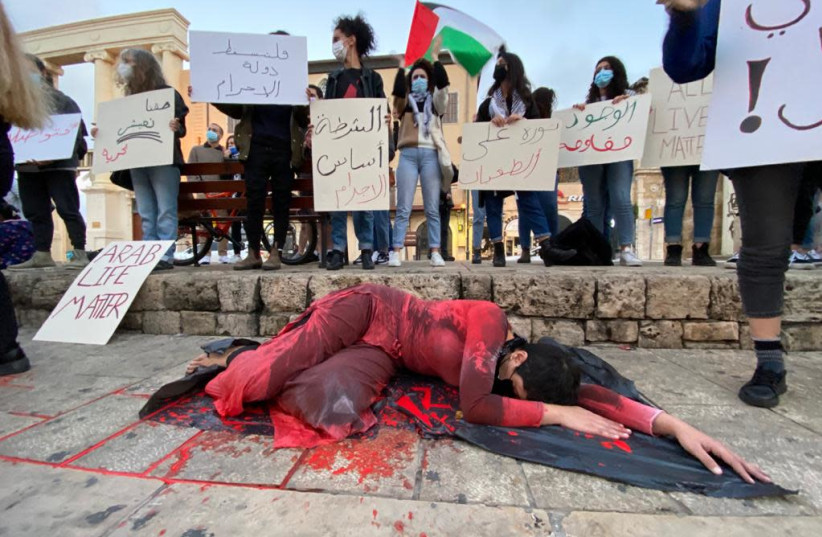President Isaac Herzog said that the country must immediately end the wave of murders in the Israeli-Arab sector.
“We cannot continue to live like this,” he said on Wednesday at the Israel Bar Association in Tel Aviv.
Herzog said we must engage in “an uncompromising struggle” against the wave of murders of Israeli-Arab citizens carried out by “terror groups against civilians that are acting like military groups” who “decide who shall live and who shall die.”
He said there are too many killings in the Israeli-Arab sector, day after day, with whole worlds of innocent people being killed, and then he went on to name several recently murdered Israeli-Arabs and briefly told some of their stories.
“Violence in the Israeli-Arab sector is a society-wide problem, which all of us, each branch of government within its own realm, are obligated to end and must do everything to eradicate,” said Supreme Court President Esther Hayut.
“Violence in the Arab sector has gone from the sidelines to the center” of that sector said Justice Minister Gideon Sa’ar, who warned that violent groups were threatening to “take over resources in the Arab sector that could weaken” efforts to fix its broader problems.
“These are very hard and unprecedented days in which harm to the Arab sector harms all civilians,” said Attorney-General Avichai Mandelblit. “With no security or public order, we cannot promote any of our other democratic values” properly.
Mandelblit said that law enforcement has recently doubled its efforts to go after violent crime in the Arab sector, both on a criminal and economic basis.

Police Chief Kobi Shabtai also commented on the problem, saying, “We need to make harsher punishments…there needs to be minimum sentences and higher fines to deter” violent crime in the Arab sector.
He said the state must ensure that committing violent crimes there is punished severely enough that “it will not be worth it.”
Shabtai added that the police have a challenging role, as it is not enough just to be tough on crime. “Only a police force that sticks to its values will be able to keep people safe and maintain the public’s faith,” he said.
Regarding the legal establishment, Herzog said, “We must be careful of how criticism of the legal establishment is voiced,” adding that there had been an unprecedented loss of faith between the different branches of government in recent years.
At the same time, he said, the judicial branch must be open to improvement, noting that Sa’ar was very committed to reaching the right balance between constructive criticism and respecting the judicial branch.
“The legal establishment is at the heart of the country,” he said. “The rule of law is one of the organizing principles of Israel,” and that Jews pray the judicial branch will succeed in its work. Moreover, he said, the independence of the judicial branch is a boon for Israel’s international image and against international legal challenges.
Similarly, Hayut said, “the legal establishment fills an essential role in maintaining the social fabric that holds all of us together. Without an independent, neutral and impartial legal establishment, there is no way to resolve disputes with respect and dignity. Without an agreed-on method for resolving disputes, we would wreck the underlying basis of our society and state.”
The Supreme Court president admitted that there were areas where the judicial establishment could and needed to improve.
Sa’ar said it was important that the political class drop threats against the judicial establishment, such as one from certain officials who said they would use a D-9 bulldozer to attack the Supreme Court building.
Former Supreme Court justice and attorney-general Menachem Mazuz expressed support for Sa’ar’s initiative, saying that even though he disagreed with Sa’ar about the content of the Basic Law on legislation – Mazuz is more liberal and Sa’ar more conservative – he thought having agreed-upon rules of how Israel’s separation of powers should work was so important that he would support Sa’ar’s version of the law.
Knesset Speaker Mickey Levy said the new government had succeeded in changing the tone and dialogue surrounding the legal establishment to one of more balance and civility. He said the new government would keep its criticism of the judicial establishment constructive and select strong new judges.
On the issue of new judges, Interior Minister Ayelet Shaked, a member of the Judicial Selection Committee, said that the panel would likely pick two liberal and two conservative justices to replace the upcoming round of four vacancies on the Supreme Court.
Candidates for the Supreme Court are due to file by the end of the month, with interviews scheduled for next month and decisions due around the end of November.
Shaked was less optimistic about Sa’ar’s goal to pass a new Basic Law regarding legislation, which would be the next brick in Israel’s quasi constitution.
According to Shaked, the gaps between the government’s right and left wings were too broad: the Left wanted to empower the judiciary and to make it harder for the Knesset to override it, and the Right wanted to reduce judicial intervention and make it easier to reverse the court’s vetoes.
